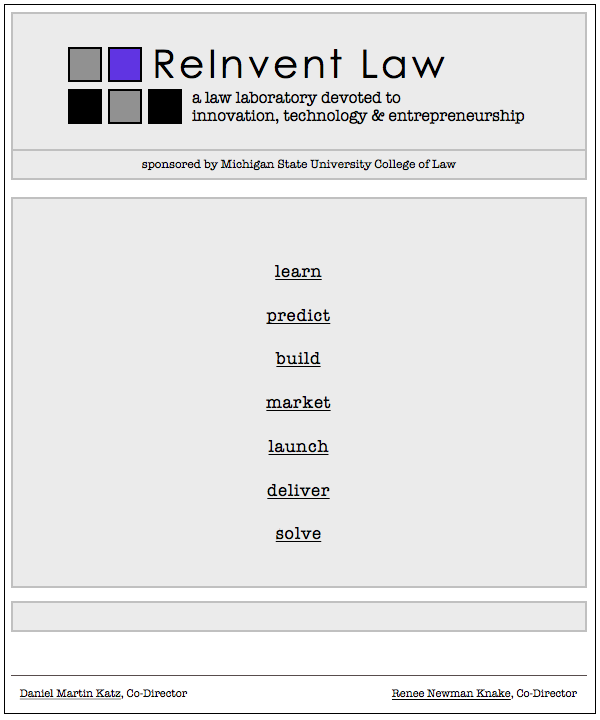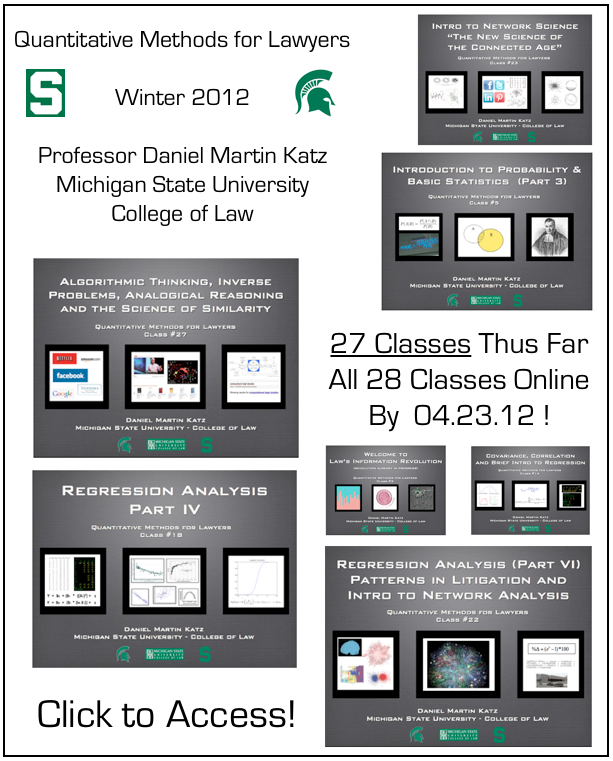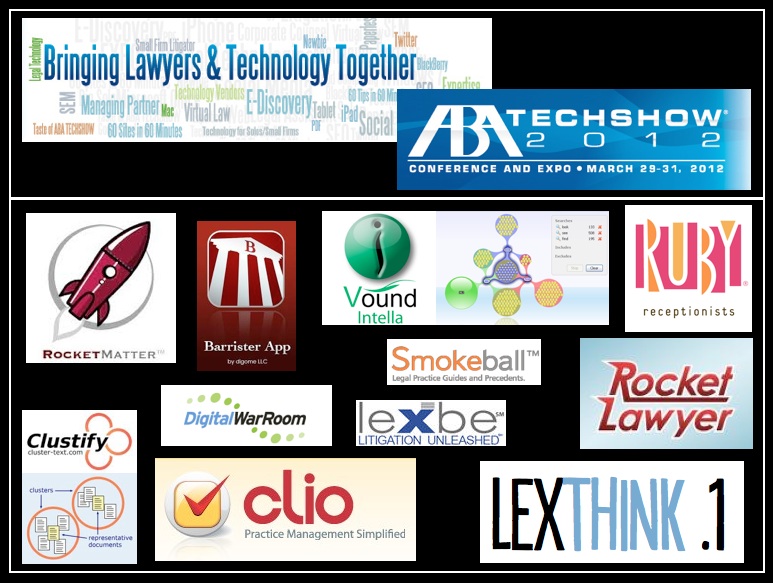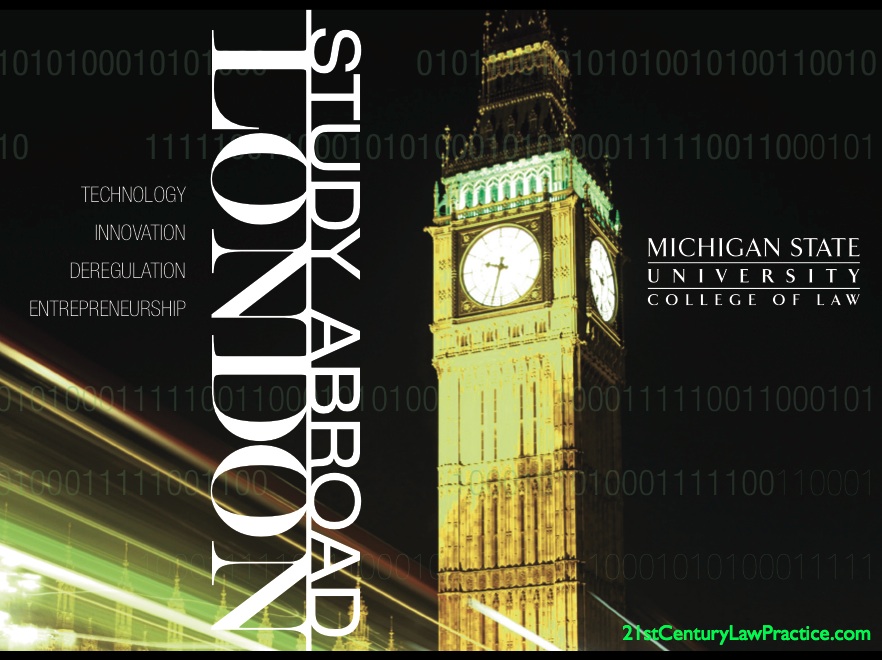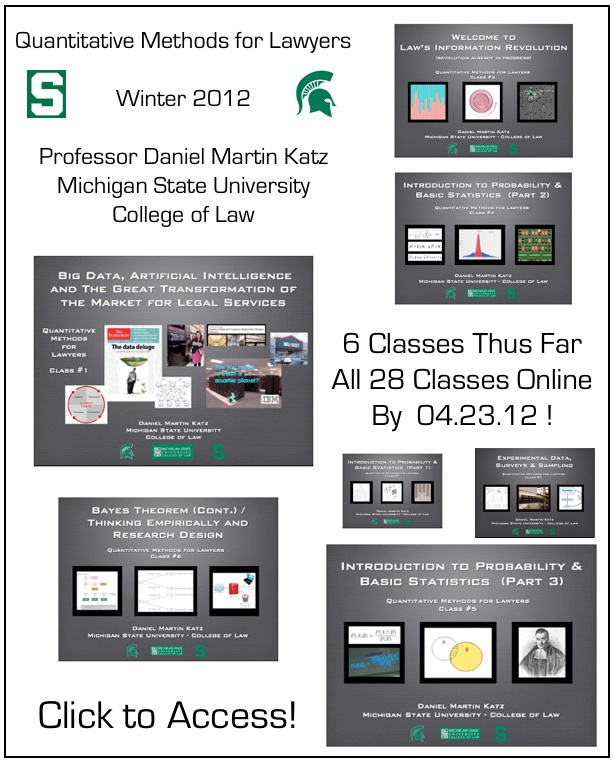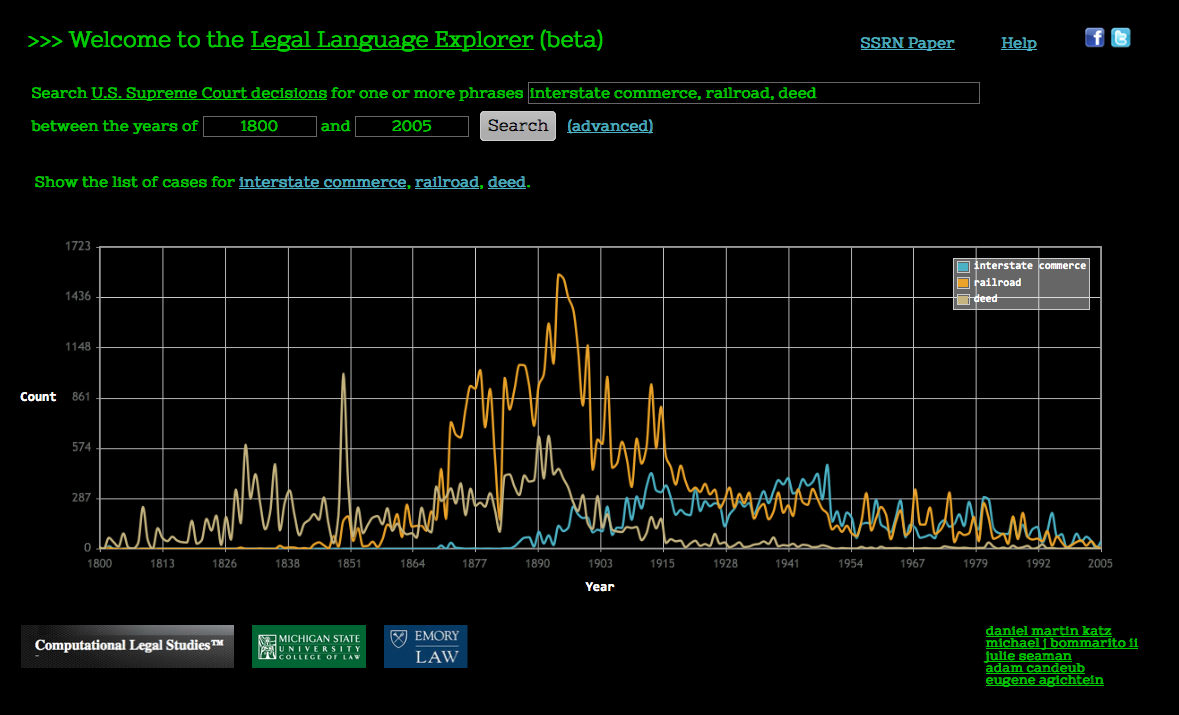Tag: artificial intelligence and law
Virginia Decoded – The Code of Virginia for Humans {49 States to Go}
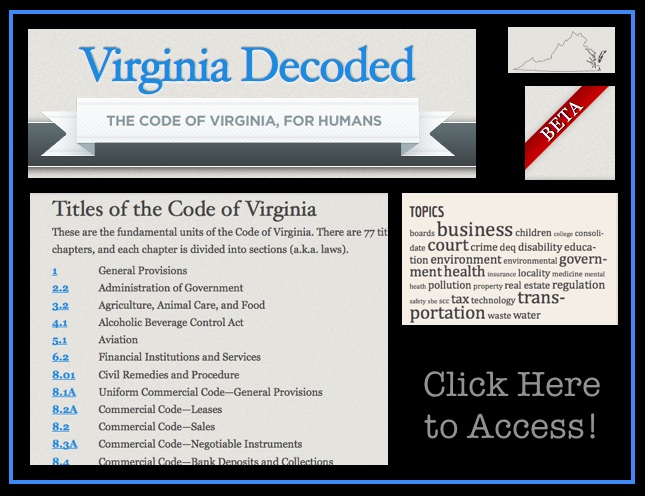 “Virginia Decoded is a private, non-governmental, non-partisan implemenation of The State Decoded, an open source project that provides a platform to display state-level legal information in a friendly, accessible, modern fashion. Virginia is the first state to deploy the software.
“Virginia Decoded is a private, non-governmental, non-partisan implemenation of The State Decoded, an open source project that provides a platform to display state-level legal information in a friendly, accessible, modern fashion. Virginia is the first state to deploy the software.
Virginia Decoded is currently in beta, which is to say that the site is under active development, with known shortcomings, but it has reached a point where it would benefit from being used by the general public (who one hopes will likewise benefit from it.) While every effort is made to ensure that the data provided on Virginia Decoded is accurate and up-to-date, it would be gravely unwise to rely on it for any matter of importance while it is in this beta testing phase.
Many more features are under development, including improvements to search, calculations of the importance of given sections of the code, inclusion of attorney generals’ opinions, Supreme Court of Virginia rulings, extensive explanatory text, social media integration, significant navigation enhancements, a vastly expanded built-in glossary of legal terms, Code download options, scholarly article citations, and much more.”
{HT: Legal Informatics Blog}
Machine Learning for Hackers – Published By O’Reilly Media [Drew Conway & John Miles White]
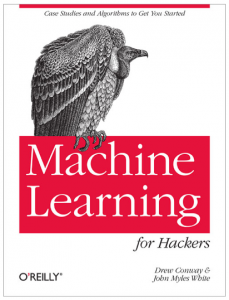 Below is the Table of Contents for the new book “Machine Learning for Hackers” by Drew Conway & John Miles White. Drew is a long time friend of this blog and we are very excited about his new book. My copy just arrived and I will be working through the book this summer (for potential inclusion in the 2013 edition of my Quantitative Methods for Lawyers Course and/or E-Discovery Course).
Below is the Table of Contents for the new book “Machine Learning for Hackers” by Drew Conway & John Miles White. Drew is a long time friend of this blog and we are very excited about his new book. My copy just arrived and I will be working through the book this summer (for potential inclusion in the 2013 edition of my Quantitative Methods for Lawyers Course and/or E-Discovery Course).
Here is the description: “Each chapter focuses on a specific problem in machine learning, such as classification, prediction, optimization, and recommendation. Using the R programming language, you’ll learn how to analyze sample datasets and write simple machine learning algorithms. Machine Learning for Hackers is ideal for programmers from any background, including business, government, and academic research.” Check it out!
TOC ML4Hackers
Technology, Innovation, Deregulation and Entrepreneurship – 21st Century Law Practice London Summer Program – Michigan State University College of Law — The Future is Today!
Program admissions are rolling and applications are due no later than March 25, 2012. Given that space in the program is limited, applicants are encouraged to submit their application as soon as possible. APPLY HERE!
If you know someone who might be interested in this exciting new program — please help us spread the word. Any student at an ABA Accredited law school is encouraged to apply.
For those who have already applied – please note we will be sending out the first round of acceptances to the program in the next few days.
Program Description:
“The MSU / Westminster 21st Century Law Practice London Summer Program is a first of its kind, intensive study of technology, innovation, regulation, entrepreneurship and the international legal marketplace. With the deregulation of lawyers in the United Kingdom and the outgrowth of alternative legal services delivery models, London is poised to become the global leader in the legal services market. Our program will educate students about these new delivery models and help prepare students for the technology infused law jobs of the 21st Century.”
Educational Objectives:
(1) Provide students a comprehensive understanding of the market for legal services as it transitions to a global legal supply chain in the wake of deregulation, economic pressures, and technological innovation.
(2) Prepare students to become practice-ready entrepreneurial lawyers who can leverage information technology in order to operate more efficiently and thereby attract (and retain) clients.
(3) Inspire students to think broadly about future delivery of legal representation and access to justice by exposing them to the innovative legal service delivery models and platforms of the present (and not-too-distant future).
Courses for the 2012 Program:
Legal Information Engineering & Technology – The increasing role of legal information technology in the law practice of today (and the not too distant future) will be highlighted in this course. Students will be exposed to a number of emerging approaches in legal automation, process engineering, informatics / ‘soft’ artificial intelligence (e-discovery, automated document generation), supply chain management, and quantitative legal prediction.
21st Century Law Practice – This course will provide students with an overview of the practice challenges facing lawyers in the 21st century, including economic pressures, technological advancements, increased globalization, international deregulation, and access to justice concerns (for example, reading the work of Richard Susskind, Thomas Morgan, and others). Building upon this background, the course will then explore a set of case studies to examine a variety of innovative new legal services delivery mechanisms and businesses in the US and the UK, such as Axiom, LawVest, Lawyers2You, LegalZoom, QualitySolicitors, Rocket Lawyer and others that have been created in anticipation of (or in some cases in response to) these practice challenges. Students will critically assess these legal service providers, and will reflect upon how lawyers and regulators should respond.
The Legal Services Act and UK Deregulation – Students will study the history and impact of the Legal Services Act and deregulation of the profession in the UK with a focus on how the resulting innovations (both regulatory changes and new legal services delivery mechanisms that follow) might be exported to the United States. Also encompassed in this course will be a comparative overview of American and British law governing lawyers and law practice, along with emphasis on globalization pressures faced by the legal profession.
Judge Peck’s Opinion on Computer Assisted Review (i.e. Predicitve Coding)
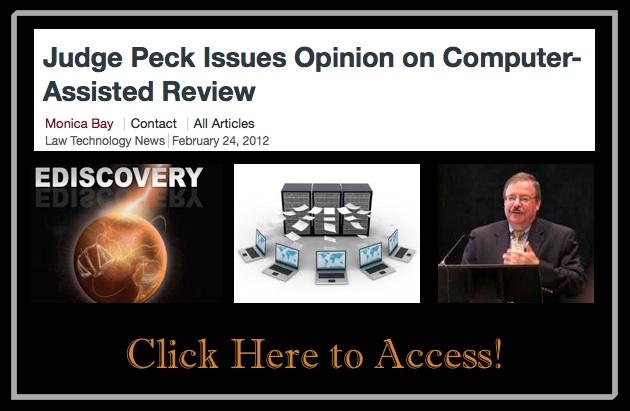 See also Monique Da Silva Moore, et al., Plaintiffs, v. Publicis Groupe & MSL Group, Defendents (Opinion and Order). as well as this article, this article, this article, this article, etc. from a few days ago (when there was a bit of misreporting on this case). [ HT: Legal Informatics Blog ]
See also Monique Da Silva Moore, et al., Plaintiffs, v. Publicis Groupe & MSL Group, Defendents (Opinion and Order). as well as this article, this article, this article, this article, etc. from a few days ago (when there was a bit of misreporting on this case). [ HT: Legal Informatics Blog ]
The Age of Big Data [via NY Times]
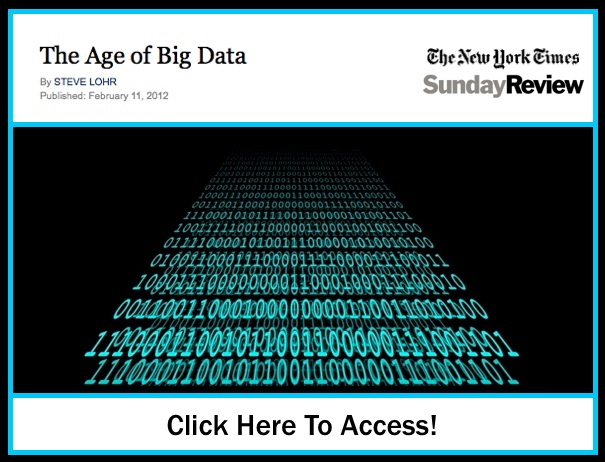 Please read this article and ask yourself how can we get in front of this – both as a profession and as an academy.
Please read this article and ask yourself how can we get in front of this – both as a profession and as an academy.
Big Data and ‘Soft’ Artificial Intelligence are the center piece of my presentation and forthcoming paper the Age of Quantitative Legal Prediction. For the legal services industry, a very different world is coming (is already here in certain circles). As a Law Professor, I am preparing my students to be the leaders in this world with my Quantitative Methods for Lawyers course, Legal Information Technology & Engineering (London Summer Program), E-Discovery as well as several other courses that my MSU colleagues and I are developing.
As I said to start the year – it is time to step up your game. 🙂
Legal Reasoning [ By Barbara Spellman & Frederick Schauer ]
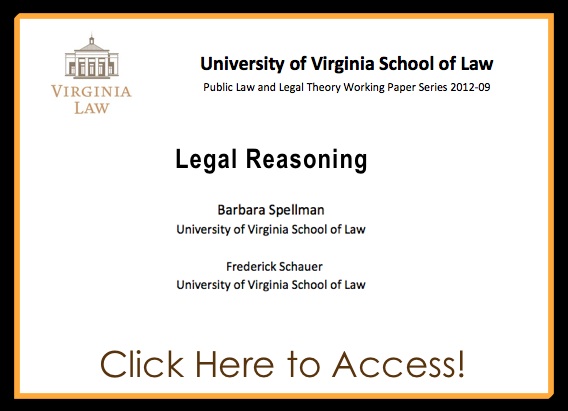 From the abstract: “The nature of legal reasoning, and its relationship with reasoning, has long been a topic of importance for lawyers and legal scholars. But it is also a topic with psychological implications, especially cognitive ones, and indeed most of the existing views about legal reasoning depend on psychological assumptions about the way in which ordinary people, lawyers, and judges reason and make decisions. This article, a chapter in the forthcoming Oxford Handbook on Thinking and Reasoning (K. Holyoak & R. Morrison eds.), explores the intersection between cognitive and social psychology, on the one hand, and legal reasoning and thinking and decision making, on the other. It attempts to show how existing psychological research is germane to the important questions about the nature legal reasoning – particularly with respect to precedent, analogy, authority, and rule-following – but even more it attempts to suggest a range of topics and questions that additions to the now-small body of psychological research might usefully address.”
From the abstract: “The nature of legal reasoning, and its relationship with reasoning, has long been a topic of importance for lawyers and legal scholars. But it is also a topic with psychological implications, especially cognitive ones, and indeed most of the existing views about legal reasoning depend on psychological assumptions about the way in which ordinary people, lawyers, and judges reason and make decisions. This article, a chapter in the forthcoming Oxford Handbook on Thinking and Reasoning (K. Holyoak & R. Morrison eds.), explores the intersection between cognitive and social psychology, on the one hand, and legal reasoning and thinking and decision making, on the other. It attempts to show how existing psychological research is germane to the important questions about the nature legal reasoning – particularly with respect to precedent, analogy, authority, and rule-following – but even more it attempts to suggest a range of topics and questions that additions to the now-small body of psychological research might usefully address.”
This is very useful paper. If anything, I believe the authors have understated the importance of these questions and this line of research – particularly in light of the broader dynamic of “human v. machine” which I have argued will come to dominate the future of the legal services industry (as well as other professional services). That does not mean that humans will be replaced writ large but there is some significant displacement coming down the pipeline — see here, here, here, here, here, etc.
Announcing the Beta Pre-Release of Legal Language Explorer.com < Search the History of ANY Phrase in the Decisions of the United States Supreme Court >
In partnership with Michigan State University College of Law and Emory Law, today we announce the Beta Pre-Release of a New Web Interface – LegalLanguageExplorer.com. We are just getting started here with this project and anticipate many features that will be rolling out to you in the near future. Please feel free to send us your feedback / comments.
BASIC FEATURES:
Instant Return of a Time Series Plot for One or More Comma Separated Phrases. The default search is currently interstate commerce, railroad, deed (with plots for each of the term displayed simultaneously).
Feel free to test out ANY phrase of Up to Four Words in length.
Here are just a few of our favorites:
Clear and Present Danger
Habeas Corpus
Custodial Interrogation
Due Process
Unconstitutional
Property
Privacy
SCOPE OF COVERAGE:
In the current version, we are offering results for EVERY decision of the United States Supreme Court (1791-2005). We plan to soon expand to other corpora including the U.S. Court of Appeals, etc.
FULL TEXT CASE ACCESS:
Each of the Phrases you search will be highlighted in Blue. If you click on these highlighted phrases you will be taken to the full list of United States Supreme Court decisions that employ this phrase:
ADVANCED FEATURES:
Check out the advanced features including normalization and alternative graphing tools.
PAPER:
Daniel Martin Katz, Michael J. Bommarito II, Julie Seaman, Adam Candeub & Eugene Agichtein, Legal N-Grams? A Simple Approach to Track the ‘Evolution’ of Legal Language in Proceedings of Jurix: The 24th International Conference on Legal Knowledge and Information Systems (Vienna 2011) available at http://papers.ssrn.com/sol3/papers.cfm?abstract_id=1971953
PRESENTATION & HELPFUL TUTORIAL:
Click on the Image Below and You Will Be Directed to our Presentation at 24th International Conference on Legal Knowledge and Information Systems ( Jurix 2011 – Vienna )
This offers some motivation for the project as well as a Brief Slide Based Tutorial Designed to Highlight Various Functions Available on the Site.
TECHNICAL IMPLEMENTATION:
Michael J. Bommarito, Building Legal Language Explorer: Interactivity and Drill-Down, noSQL and SQL available at http://www.michaelbommarito.com/blog/2011/12/16/building-legal-language-explorer-interactivity-and-drill-down-nosql-and-sql/

